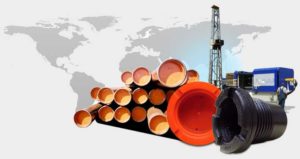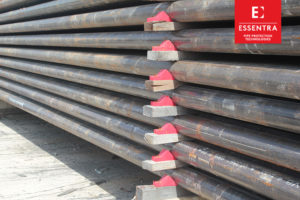Few working environments present a bigger risk to operational and occupational safety than drill pipe safety in the oil and gas industry. Due to the remote locations of rigs and the type of activities that take place during oil and gas operations, focusing on safety is a primary concern for regulators, producers, and other associations. According to the International Association of Drilling Contractors (IADC), working with drill pipes is how most injuries occur on rigs.
Drill Pipe Safety
Drill pipes are essential pieces of equipment for oil and gas producers. If operators prioritize drill pipe safety and replace sections as required, these vital pieces of pipe can ensure wells operate reliably and keep producing long after completion. To ensure they remain safe to use, operators will inspect and verify the pipe’s integrity at different times.

Verifying Drill Pipe Integrity
Drill pipes operate under harsh working conditions. The sections are, therefore, subject to deformation and excessive wear. This requires operators to regularly inspect their pipes and verify the integrity of the drill string.
Using a spherometer, operators can quickly measure the radius of a section of a pipe. Based on the results, operators classify drill pipes according to their suitability for use. These include:
- N-Class: Denotes new pipes or sections still close to the original manufacturer’s quality
- P-Class: Premium pipes that are still usable but show some signs of wear
- C-Class: These are well-worn pipes approaching their end of life. C-Class pipes have sub-classifiers of C-1, C-2, and C-3 to differentiate their levels of wear.
As new pipes are expensive, operators will often reuse drill pipes or sell them to other companies. However, once a pipe reaches its end of life, operators should grade them for scrap.
Tips for Maintaining Drill Pipes to Maximize Their Useful Life
To ensure drill pipe safety, operators need to ensure they follow the best practices during every step of the production lifecycle. When storing or handling pipes, they’ll need to use pipe chocks, bumper rings, lifting bails, and pipe handling systems. This will help prevent surface-to-surface contact that can lead to corrosion and provide operators with a rigid and secure storage and handling solution.
Another area that requires protection is the pipe threads. Exposing threads to the elements can lead to failures downhole. To protect drill pipe threads, operators should use protectors on both ends of every section. Thread protectors will reduce corrosion, protect against impact damage, and increase the useful life of drill pipes.
MSI Pipe Protection Technologies for Drill Pipe Safety
To help secure your oil and gas investments, MSI Pipe Protection Technologies provides robust solutions that help extend the useful life of drill pipes. By ensuring every section remains secured and protected from the elements, producers can improve the operational integrity of their wells.
For more information about MSI Pipe Protection Technologies’ drill pipe protection solutions, reach out to a product expert today.




